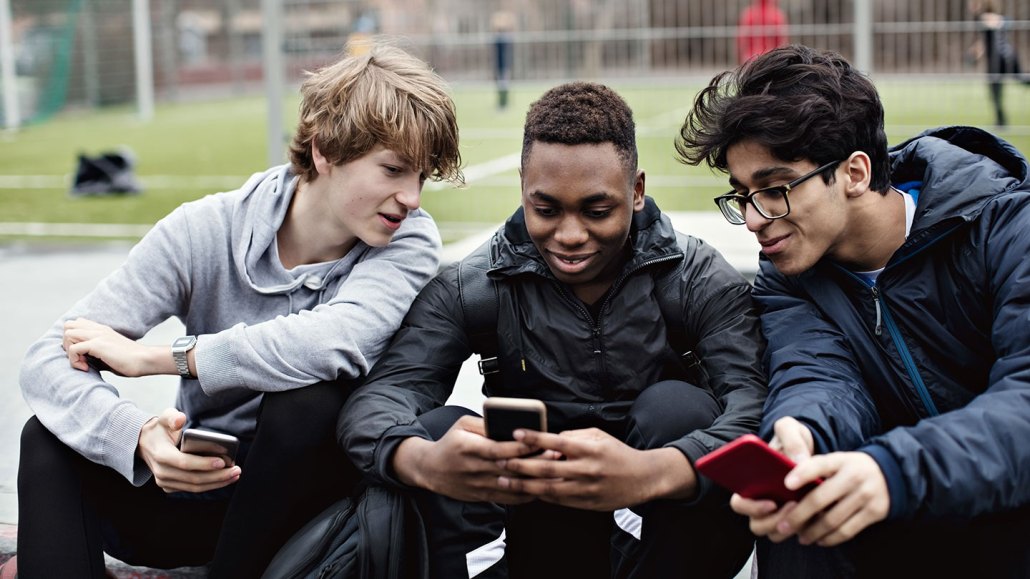Questions for ‘Top 10 tips for how Gen Z’ers can get the best online experiences’

Smartphones can be a great way to connect with friends. Learn how to reap these benefits while managing the risks of life online.
Maskot/Getty Images
Share this:
- Share via email (Opens in new window) Email
- Click to share on Facebook (Opens in new window) Facebook
- Click to share on X (Opens in new window) X
- Click to share on Pinterest (Opens in new window) Pinterest
- Click to share on Reddit (Opens in new window) Reddit
- Share to Google Classroom (Opens in new window) Google Classroom
- Click to print (Opens in new window) Print
To accompany ‘Top 10 tips for how Gen Z’ers can get the best online experiences’
SCIENCE
Before Reading:
- Consider how much time in a day you spend looking at a screen. Is it easier to measure this time in seconds, minutes or hours? Do you think the amount of time you spend looking at a screen is more than, less than or about the same as your peers? If someone asked you to estimate your average daily screen time, would you feel tempted to overestimate, underestimate or accurately estimate your screen time? Explain why.
- What are some benefits to the time you spend on screens? What are some potential drawbacks to this screen time?
- Imagine you could suddenly have an extra hour every day. The catch is that you only get this extra hour if you spend it doing a hobby. (Scrolling through social media doesn’t count as a hobby!) Would you pick a new hobby or one that you already have? What hobby would you choose? What is one way your life might differ by the end of the school year if you worked on this hobby compared to if you had not?
During Reading:
- According to a survey by the Pew Research Center, what share of teens go online daily?
- Give an example of “active” screen time from this article. Give an example of “passive” screen time.
- What is the title of the book written by Emily Weinstein?
- How many hours per year is the average student distracted by a digital device while doing homework? What is an example of an action you can take to reduce such distractions while doing homework?
- What is the goal of the free online course called Finding Focus?
- Name one action you can take to address cyberbullying when it happens.
- Sam Ehrenreich says that getting support from online groups can be helpful for some. But he warns there may come a point when you need more support than an online group can offer. Identify one identified resource that is available to people in need.
- How might the Common Sense Digital Citizenship Curriculum help people?
- How might a seemingly insignificant piece of information, such as your favorite movie or a photo of your pet, be used against you by online tech companies?
- What action can you take if someone shares explicit images of you online?
After Reading:
- Refer back to your answer to Question 3 in Before Reading. Would you still pick this hobby if given the choice? If not, what would you choose instead? Do you predict you would feel better, worse or about the same if you had this extra hour to work on a hobby compared to if you did not? Based on your reading, how likely is it that an average student might do something each day to free up some time away from screens? Refer to specific findings in this story to support your answer.
- Consider how you spend time online. What screen time activity or app would you consider your biggest time-waster? Based on your answer, pick one of the 10 suggestions in this story most likely to benefit you. Explain your choice.
- Many apps are designed to be “time-sinks.” Instagram, Snapchat and other such apps learn what type of content will keep you scrolling to the next image or video, and in which order. Consider the types of content displayed on your most-used app, then briefly describe two categories of content that you see in the app. For example, do you get shown cute animal videos? Or perhaps fashion or sports-related content? What benefit might a tech company derive from keeping a person’s eyes on their content? Describe what potential consequences a screen user might suffer from finding the tech company’s content so watchable.